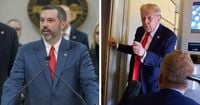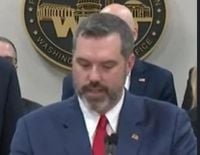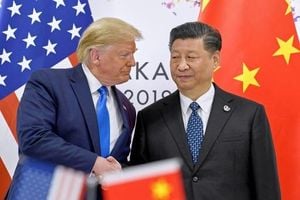President Donald Trump’s recent shakeup at the U.S. Attorney’s Office for the Eastern District of Virginia has ignited a fierce debate over the boundaries between justice and politics. On September 19, 2025, Erik Siebert, the acting U.S. Attorney, resigned under pressure from the Trump administration after his office failed to bring criminal charges against New York Attorney General Letitia James regarding allegations of mortgage fraud. The fallout has been swift and contentious, with Trump moving quickly to name Lindsey Halligan, one of his former defense attorneys, as his pick to lead the powerful prosecutor’s office.
Siebert’s resignation capped months of mounting tension. According to ABC News, the Trump administration had pressed Siebert to indict James, despite investigators concluding there was insufficient evidence to support criminal charges. The allegations stemmed from claims by William Pulte, director of the Federal Housing Finance Agency, who accused James of falsifying bank documents and property records to secure government-backed loans and better terms. Pulte’s letter to Attorney General Pam Bondi, obtained by CBS News, became the catalyst for the federal probe. Yet, after an extensive investigation, Siebert’s team could not find clear evidence of wrongdoing.
Letitia James, for her part, has vigorously denied the accusations, telling NY1, “The allegations are nothing more than a revenge tour.” She has long been in Trump’s crosshairs, especially since she sued Trump and the Trump Organization in 2022, alleging they inflated property values to secure favorable loans. That civil case led to a court order for Trump to pay $355 million in restitution, a sum later raised to $527 million with interest before being overturned on appeal. James has appealed the reversal, keeping the legal battle alive.
Siebert’s departure was confirmed in an email to staff, reviewed by the Associated Press, in which he praised his colleagues as “the finest and most exceptional of DOJ employees, who care deeply about our nation and our EDVA community.” Notably, he made no mention of the political firestorm surrounding his exit. Maya Song, his top deputy, also stepped down from her leadership role, opting to return to the ranks as a line prosecutor, according to AP sources.
President Trump wasted no time making his position clear. On his social media platform, he declared, “He didn’t quit, I fired him!” Trump’s public rationale? Siebert had received “UNUSUALLY STRONG support” from Virginia’s Democratic Senators Tim Kaine and Mark Warner. “When I learned that they voted for him, I said, I don’t really want him,” Trump told reporters in the Oval Office. In a subsequent post, he added, “Next time let him go in as a Democrat, not a Republican.”
The senators responded with a joint statement, as reported by UPI: “Erik Siebert is an ethical prosecutor who refused to bring criminal charges against Trump’s perceived enemies when the facts wouldn’t support it. The Eastern District of Virginia is at the forefront of significant cases essential to our national security, and just like any court in America, should be focused on justice instead of a thin-skinned president’s vendettas.”
Legal and political analysts have been quick to point out the broader implications of Siebert’s ouster. As CNN and The New York Times noted, the episode has raised concerns about the independence of the Justice Department and the risk of political interference in federal prosecutions. Critics warn that pressuring prosecutors to pursue cases without sufficient evidence could undermine the integrity of the legal system and set a dangerous precedent for using government authority against political opponents.
Into this maelstrom steps Lindsey Halligan, Trump’s nominee to replace Siebert. Halligan is no stranger to the former president, having represented him during the classified documents investigation—a high-profile case that saw Trump’s handling of sensitive materials scrutinized by the Justice Department. Halligan, who is licensed to practice law in Florida and currently works as a special assistant in the White House staff secretary’s office, has no prosecutorial experience. Nonetheless, Trump praised her on Truth Social as a “tough, smart, and loyal attorney, who has worked with me for a long time, including in the winning fight against the Weaponization of our Justice System by Crooked Joe Biden and the Radical Left Democrats, which she witnessed firsthand when she stood up for my rights during the Unconstitutional and UnAmerican raid on my home, Mar-a-Lago, in Palm Beach, Florida.”
Halligan’s nomination has already sparked debate within legal circles. While Trump lauded her as a “tremendous trial lawyer,” critics point out her lack of prosecutorial credentials and limited experience in federal criminal law. According to ABC News, Halligan’s legal background is primarily in insurance claims, and she was brought onto Trump’s legal team during the classified documents probe. More recently, she was tasked with addressing what the administration calls radical ideology at Smithsonian Institution museums—a responsibility that, while notable, is far removed from the demands of leading one of the nation’s most important U.S. attorney’s offices.
In the interim, Attorney General Pam Bondi appointed Mary "Maggie" Cleary as acting U.S. attorney for the division. Cleary is an attorney active in Republican politics who recently rejoined the Justice Department as senior counsel in the criminal division, after stints in Virginia state agencies and the Culpepper Commonwealth’s Attorney’s Office. Cleary herself was previously placed on administrative leave for being present on Capitol grounds during the January 6, 2021, riot, though she maintains she was “framed” and was ultimately cleared. Cleary will serve until a nominee is confirmed.
The investigation that led to Siebert’s downfall was rooted in allegations that James falsified her residence status at a home in Norfolk, Virginia. The Trump administration’s push to indict her was met with resistance from career prosecutors, who found the evidence lacking. As Politico and The Washington Post reported, the episode has become a flashpoint in the ongoing battle between the Trump administration and its political adversaries, with each side accusing the other of weaponizing the justice system.
James’s spokesperson summed up the standoff in a statement to CBS New York: “Attorney General James is focused every single day on protecting New Yorkers, especially as this Administration weaponizes the federal government against the rule of law and the Constitution. She will not be intimidated by bullies—no matter who they are.”
As the Eastern District of Virginia awaits Senate confirmation of a new U.S. attorney, the episode stands as a stark reminder of the tensions that can arise when law, politics, and personal vendettas collide. The outcome of Halligan’s nomination—and the ongoing legal battles between Trump and his political foes—will undoubtedly shape the landscape of American justice in the months to come.





